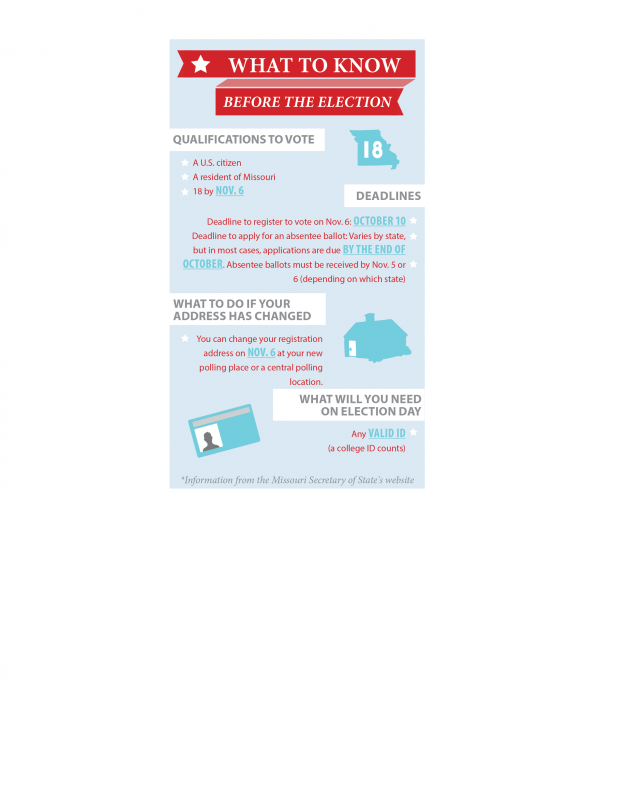Politics
Voter drive pushes renewed interest
While Washington University will not be playing the same role in the national political stage that it has for several election cycles, campus organizations are continuing to try and engage students for Nov. 6.
Run through the University’s Gephardt Institute for Public Service, a new on-campus program strives to make voter registration simpler and more convenient for students.
On Sept. 18, the Gephardt Institute will host all-day voter registration at various sites around campus.
Hattori acknowledged the challenge of stirring enthusiasm to vote on campus compared with years prior due to the fact that the University will not be hosting a presidential or vice presidential debate this election cycle. In 2008, the University hosted former Governor Sarah Palin and then-Senator Joe Biden for one of the vice presidential debates.
But she said her expectations remain high.
“The level of excitement [that year] was just that much higher. There was more money, Student Union had more focus on it, we could build a lot of things around it,” Hattori said. “We registered about 2000 people to vote in 2008. So my goal would be to top that.”
Sophomore David D’Alessandro agreed that the debates would likely have encouraged more political involvement among students.
“I think the debate…most likely had some effect in bringing kids out to vote. I also think there’ll definitely be a noticeable drop in students registering this year,” he said.
Though other universities may be taking the spotlight this year, Officials at the Gephardt Institute for Public Service, including assistant director Robin Hattori, believe a student’s college years are crucial to forming voting experience.
“We want to get people in the habit [of voting] when they’re young because they’re 18 and it’s the first time they get to vote,” Hattori said. “We want to instill the ethic of…this is my civic duty; it’s a part of being in this democracy.”
To facilitate absentee ballot registration, the University partnered with Northwestern University as part of the UVote Project, which provides colleges with a user-friendly, nationwide database of absentee ballots for each state.
Six sites on campus, including the School of Medicine, School of Law, Brown School and the Lopata Multipurpose Room, will be providing students with registration materials and information. The Danforth University Center and Bear’s Den will have forms for those who choose to register out-of-state.
The Gephardt Institute for Public Service has also joined with Student Union to create Issues and Ideas in Election 2012, a series of discussions that students can attend on issues ranging from the media to national security.
Mariano-Florentino “Tino” Cuellar, a faculty member at the Stanford University Law School and expert on immigration law and politics, will kick off the series this Monday at noon in the Bryan Cave Moot Courtroom in Anheuser-Busch Hall.
Junior Adam Flores, who spent this past summer with Hattori coordinating student voter registration initiatives on campus, played a key role in organizing Tuesday’s events.
He wants people to know that despite the common belief that one person’s vote doesn’t really make a difference, every vote really does have a significant impact.
“A lot of people take their vote for granted, and a lot of people argue, ‘Well, my vote doesn’t matter. I’m in Illinois; it’s going to be blue anyway,’ or, ‘I’m in Texas; it’s going to be red anyway,’” he said. “But I think it’s important to show you are engaged in the politics of the country. Local politics will influence your day to day life, national politics could influence your job.”
Junior Matt Lauer, president of the College Republicans, emphasized the long-term benefits of early political involvement.
“Either side will tell you that if you get people involved early, it becomes a habit. If more people vote, we will get an informed citizenry,” Lauer said. “And there is a greater chance that if they get registered now, they will become informed voters by November.”
President of the College Democrats, junior Leigha Empson, said that registering to vote in Missouri could play a significant part in the presidential election.
“Every vote in Missouri counts. Had every student at Wash. U. voted for Obama in 2008, he would’ve won the state. And starting to vote now begins a lifelong habit,” she said.
Senior Mary Yang hasn’t registered for voting yet and says it’s not a high priority for her.
“If someone asked me to [go to the event] I probably would, but otherwise I probably wouldn’t,” she said. “I know [my vote] definitely matters, but I’m not really into politics. I guess sometimes I wish I were, but it’s not up there on my priority list.”
Junior Andrew Stober, on the other hand, changed his registration from his home state of California to Missouri in his freshman year. He voted in the 2010 midterm elections and this year’s presidential primaries.
Stober, like many students, thinks his vote carries more weight in the bellwether state.
“I think my vote probably has more significance here than in California,” he said.

